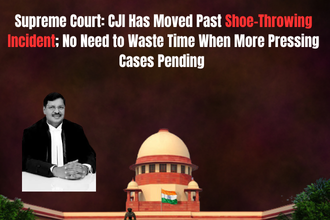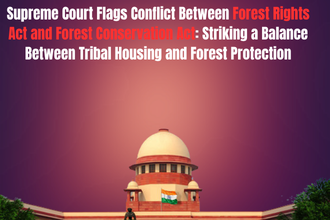In a strongly worded observation reflecting judicial restraint and institutional dignity, the Supreme Court of India on Thursday stated that it would not waste time revisiting the recent shoe-throwing incident targeting Chief Justice of India (CJI) BR Gavai, especially since the CJI himself has moved past the episode.
A Bench comprising Justice Surya Kant and Justice Joymalya Bagchi made these remarks while hearing a mention by Supreme Court Bar Association (SCBA) President Vikas Singh, who urged the Court to take up a criminal contempt case against Advocate Rakesh Kishore—the lawyer who threw a shoe at the CJI on October 6, 2025.
“CJI has shown magnanimity, and it shows that the institution is not affected as such,” Justice Kant observed, emphasizing that the judiciary should focus on cases that affect citizens directly rather than amplifying disruptive acts.
Background: The Shoe-Throwing Incident
The incident took place on October 6 inside a courtroom of the Supreme Court, where Advocate Rakesh Kishore hurled a shoe towards the dais where CJI Gavai was sitting with Justice Vinod Chandran. The attack, though unsuccessful, sparked widespread outrage and led to the suspension of Kishore’s license by the Bar Council of India (BCI).
Reports suggest that Kishore’s act stemmed from anger over CJI Gavai’s remarks in a previous case concerning the restoration of a beheaded idol of Lord Vishnu in Khajuraho. The CJI had, during that hearing, remarked that the petitioner could “go and ask the deity” for redressal—comments that some groups interpreted as offensive to religious sentiments.
Additionally, Kishore had criticized CJI Gavai’s comments made during a visit to Mauritius, where the Chief Justice reportedly spoke against the use of bulldozers in demolitions in India. The lawyer publicly alleged that the CJI’s stance on these issues was “politically motivated,” an accusation the judiciary has firmly rejected.
Bar Leaders Demand Criminal Contempt
On Thursday morning, SCBA President Vikas Singh mentioned the incident before the Bench of Justices Surya Kant and Joymalya Bagchi, urging the Court to initiate criminal contempt proceedings against the errant advocate.
“This shoe-throwing incident cannot go unnoticed like this. The person has no remorse. I have already sought consent from the Attorney General, and the criminal contempt case could be listed tomorrow. Social media has gone berserk,” Singh stated.
Supporting this submission, Solicitor General of India Tushar Mehta agreed that the incident was serious and threatened the institutional integrity of the judiciary.
“Consent for initiating contempt proceedings has been given. It is the institution’s dignity that is at stake. Some action is needed,” Mehta said.
Court: No Need to Fuel Hate Algorithms
While acknowledging the gravity of the incident, the Bench questioned the utility of keeping the issue in public discourse. Justice Bagchi, in particular, warned against feeding social media algorithms that thrive on sensationalism and outrage.
“Algorithms are designed to work on hate, caste, and anger—they get more hits and likes. Your mentioning today will only be monetised. We do not have to cooperate with this monetisation; let it die a natural death,” Justice Bagchi cautioned.
Justice Surya Kant concurred, observing that CJI Gavai’s calm response demonstrated the maturity and strength of the institution.
“CJI has shown magnanimity, and that itself speaks for the institution,” he said.
The Bench further observed that spending more time discussing the incident would divert attention from urgent matters, such as bail hearings and pending appeals.
“You have to consider—whether raking up an incident which we have given closure to, is needed at all? Especially in an overburdened court. Spending five minutes on this, we could have decided cases where persons are in jail or want bail,” Justice Bagchi remarked.
Vikas Singh and Solicitor General Press for Action
Despite the Court’s reluctance, Vikas Singh persisted, highlighting the symbolic importance of protecting the judiciary’s dignity.
“This is an insult to Lord Vishnu also. I’m sure even He would not want this. The glorifying of the shoe-throwing incident needs to end,” Singh said.
He even suggested that the Court could pass a John Doe order—a blanket directive restraining all persons or entities from making contemptuous comments on social media.
However, Justice Bagchi rejected the idea, noting that such orders often backfire, triggering even greater online outrage and commentary.
“A John Doe order will lead to a cavalcade of comments. It is our behaviour and how we handle ourselves that garners respect. The CJI has brushed it aside as the act of an irresponsible citizen,” he responded.
“Let It Die a Natural Death”: Court’s Emphasis on Institutional Composure
Justice Bagchi underscored that judicial composure, not public outrage, defines institutional respect.
“It is our behaviour and how we handle ourselves that we garner respect,” he said.
He further noted that social media thrives on sensationalism, and that amplifying incidents of violence only serves commercial interests rather than justice.
“Once we take this up, it will again be spoken about for weeks. We have become money-spinning ventures,” Justice Bagchi observed.
Solicitor General Tushar Mehta echoed this concern, stating:
“Social media works on algorithms that make users addicted. We (social media users) are in fact the products; it’s not that we are using it.”
Justice Bagchi responded in agreement, saying,
“Exactly. That is why we should not fuel it further.”
Judicial Dignity vs. Public Discourse
The shoe-throwing incident has reignited debates on public decorum, professional ethics, and judicial accountability. However, the Supreme Court’s refusal to sensationalise the matter reinforces a broader principle: judicial dignity is best protected through silence and focus on duty, not retaliation.
Justice Surya Kant summed up the Court’s position succinctly:
“Let us see what happens in a week and read more saleable items,” he said wryly, hinting that public interest would soon shift elsewhere.
Justice Bagchi added humorously,
“After the vacation, maybe some other saleable items will come up.”
CJI Gavai’s Dignified Silence
Since the October 6 incident, CJI BR Gavai has not publicly commented, other than indicating that he has moved past the matter. His dignified silence and refusal to engage in confrontation have been widely appreciated within judicial circles.
Legal observers note that this response reinforces the Supreme Court’s institutional resilience and sends a powerful message about restraint, tolerance, and composure under provocation.
Broader Implications
The Court’s stance underscores two key points:
- Institutional Focus Over Sensationalism:
The judiciary must not let isolated acts of misconduct distract it from its constitutional function—dispensing justice efficiently and impartially. - Responsible Use of Social Media:
The Court’s warning against “hate algorithms” highlights the urgent need for digital responsibility and awareness among legal professionals, journalists, and citizens.
By choosing silence over spectacle, the Supreme Court reaffirmed that the strength of the institution lies in its restraint, not in reactive measures.
Conclusion
The Supreme Court’s decision to avoid rehashing the shoe-throwing incident marks a mature, forward-looking approach to judicial crises. Instead of yielding to media frenzy or online outrage, the Court reaffirmed its commitment to justice, discipline, and composure.
As Justice Bagchi aptly put it, “Algorithms thrive on hate and anger—we must not cooperate in their monetisation.”
In doing so, the Bench not only de-escalated a moment of institutional tension but also reminded the nation that judicial integrity is best demonstrated by action, not reaction.
Also Read



